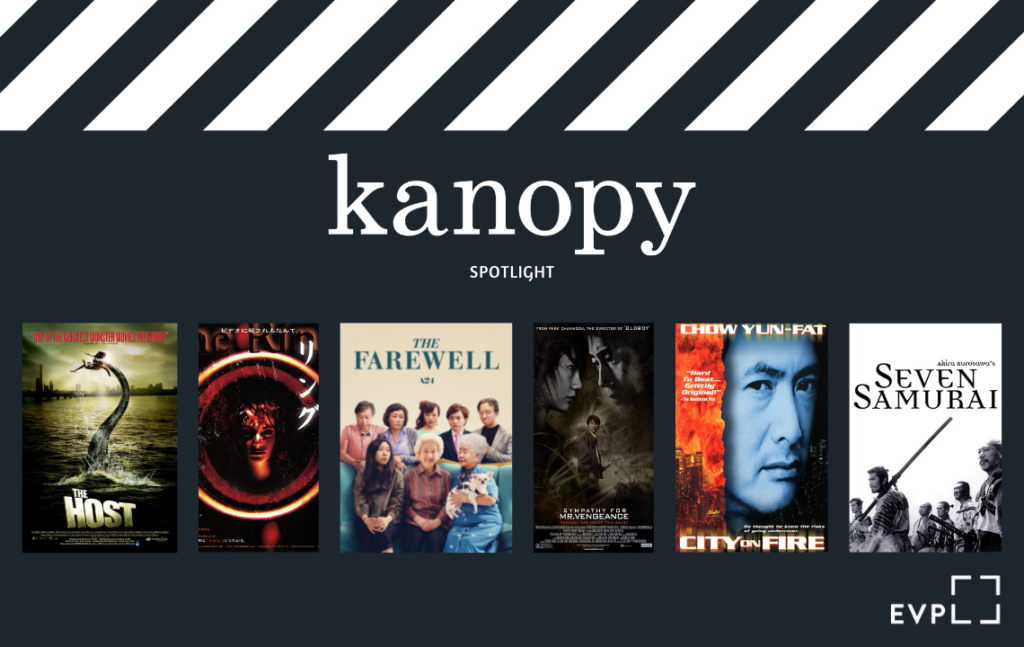Check out these films out of Japan, South Korea, and China, available on Kanopy
**Please note some films mentioned in this post are not appropriate for all ages.**
EVPL is proud to have Kanopy – a free, digital streaming service for libraries. Watch great movies with the click of a button but without the monthly fee of most streaming services. The app – available to download on evpl.org – works on phones, desktops, Roku, and Amazon Firestick. As an EVPL user, you will have access to 20 films per month. This feature looks at some of what Kanopy has to offer, highlighting a particular filmmaker, actor, studio, genre, or theme.
This time, the spotlight is on Asian cinema. From somber period pieces to martial arts action flicks to fantastical wuxia that combines the two, the films and their genres have captivated audiences in both their own countries and around the world for well over one hundred years. Master filmmakers like Akira Kurosawa were viewed with awe by their peers, while movie stars like Bruce Lee, Jackie Chan, and Chow yun-Fat broke box office records, home and abroad. Asian horror in the late 1990s and early 2000s redefined the genre and soon changed the way Western horror was told, too. Kanopy’s selection of Asian titles is as diverse and varied as the films themselves, but here is a small window into the types of films offered, coming from Japan, South Korea, and China, both mainland and Hong Kong.
The Host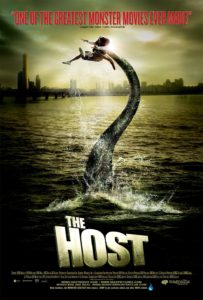 (2006)
(2006)
Director: Bong Joon-ho
Features: Ah-sung Ko, Du-na Bae, Hae-il Park, Hie-bong Byeon, Kang-ho Song
Runtime: 120 mins.
Rating: R
Want more monster action after seeing Godzilla vs. Kong? Curious about director Bong Joon-ho’s other films after his 2019 Academy Award win for Parasite? Either way, The Host is a unique and incredible monster film unlike any other. When formaldehyde is illegally dumped into the Han River by the U.S. government stationed in South Korea, a small fish mutates into a creature the size of a truck. A lazy but good-hearted man, Gang-du (Parasite’s Song Kang-ho) is distraught when the monster seemingly kills his daughter, Hyun-seo (Go Ah-sung). Placed into quarantine for possible infection, Gang-du receives a phone call from his daughter, still alive but in the creature’s sewer lair. No one believes him, so it is up to Gang-du’s dysfunctional family to collectively break out of quarantine and save Hyun-seo…
The tone of The Host is unusual, simultaneously taking the action and human drama seriously while acknowledging the absurdity and dark humor in the situation. In perhaps the most powerful, or at least bizarre, scene in the film, the Park family cries, screams and wrestles with each other on the ground in the foreground, hysterically shouting, while a worker scolds someone else for their parking space in the background. Like the original Godzilla film Gojira (1954), the film serves as a political commentary on the U.S. military and the way that other countries end up being the ones left to deal with the consequences of the U.S.’ actions. “Director Bong,” as he is affectionately known, has two other films on Kanopy: his debut, Barking Dogs Never Bite (2000) and his crime thriller, Mother (2009), but The Host is accessible, exciting, tragic, and emotionally powerful in a way few monster movies are.
Ring aka Ringu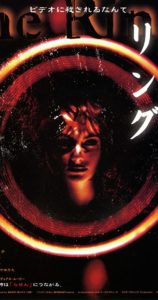 (1998)
(1998)
Director: Hideo Nakata
Features: Miki Nakatani, Nanako Matsushima, Yûko Takeuchi
Runtime: 96 mins.
Rating: PG-13
Tell me if you have heard this one before: there is a cursed videotape. Strange things appear on it. Once you watch it, you have seven days before it catches up with you and you die in fear and agony. Although this is the plot of The Ring (2002), it was first the plot of Ring, or Ringu, a Japanese horror film from 1998. In both stories, a journalist (played here by Nanako Matsushima) and her ex-husband (Hiroyuki Sanada) trace the history of the videotape from the deaths of two teenage girls to the origins of the long, dark-haired girl, Sadako shown on the tape. Can they uncover the mystery and outrun the ticking clock put on them, or will they see something arise from their TV set…?
Truthfully, this was not the first incarnation of the story either. It began as a novel written by Koji Suzuki and even before this film, it was turned into a TV movie in Japan in 2005. However, it is this film that put the franchise on the map, inspiring a plethora of sequels, prequels, reboots, and remakes, including one from South Korea (starring The Host’s Bae Doona) and even a crossover battle between Sadako and Kayako from the Ju-On / The Grudge franchises. Although Gore Verbinski directed the American remake with Naomi Watts, Japanese director Hideo Nakata actually directed that film’s sequel, his first American film. Even with as big as the property became, the original 1998 film is still a fantastic horror film that builds suspense and dread even when you know its premise.
 The Farewell (2019)
The Farewell (2019)
Director: Lulu Wang
Features: Awkwafina
Runtime: 100 mins.
Rating: PG
Based on a “true lie” as the opening card says, The Farewell, or Don’t Tell Her as it was re-titled in China, tells the story of Chinese born but American raised Billi (Awkwafina), who learns from her father (Tzi Ma) that his mother, Billi’s grandmother (Zhao Shu-zhen) is dying… but no one in the family is going to tell her. This doesn’t make sense or seem morally right from Billi’s American perspective, but her family insists this is normal in Chinese tradition. Under the guise of a wedding, the whole family gathers in China to say goodbye to her one last time without saying the words– something that is hard for everyone but especially for Billi, who doesn’t want to lie to her “Nai Nai” in the first place…
The Farewell is based on an actual incident in the life of director Lulu Wang (partner of Moonlight’s Barry Jenkins), who first told the story on an episode of the public radio show This American Life. A bilingual film that often switches from English to Mandarin with English subtitles, the “meta” aspect of the movie got even stranger when the real life grandmother (who still had not been told her terminal diagnosis) learned her granddaughter was making a movie in her hometown of Changchun and frequently visited the set, all while Wang and the crew kept secret what the film was about. Only when the film was finished and released in China did her Nai Nai tell her sister, “Little Nai Nai” (who plays herself in the movie) that she understood she was the “her” of the title Don’t Tell Her. Speaking to audiences both domestic and abroad, Awkwafina won Best Actress – Musical or Comedy at the 2020 Golden Globe Awards while the film won Best Picture and Best Supporting Actress (Zhao) at the 2020 Independent Spirit Awards.
Sympathy For Mr. Vengeance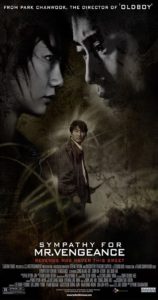 (2002)
(2002)
Director: Park Chan-wook
Features: Doona Bae, Ha-kyun Shin, Kang-ho Song
Runtime: 122 mins.
Rating: R
Starring both Bae Doona and Song Kang-Ho from The Host (2006), Sympathy for Mr. Vengeance is violent, nihilistic, shocking, sickening, and captivating. When a young deaf man named Ryu (Shin Ha-kyun) loses his job, he has no idea how to pay for his sister’s kidney operation. An attempt to deal with black market organ dealers makes things even worse. Nowhere else to go, Ryu’s girlfriend, Yeong-mi (Bae) suggests they kidnap the daughter of Park Dong-jin (Song), the president of the company Ryu was fired from, in order to get a ransom to pay for the operation. At this point, our “sympathies” begin to shift away from Ryu and towards Dong-jin, desperate to find his daughter and make the people who took her pay. As things continue to go wrong and tragedy compounds upon tragedy, the spiral of death and betrayal winds deeper and deeper…
This film makes up the first part in an unofficial “Vengeance Trilogy” all directed by Park Chan-wook and showing vengeance’s consequences and heavy toll, far beyond the conventional Hollywood revenge film. Although Sympathy for Mr. Vengeance received mixed reception and middling box office when it was released in South Korea in the early 2000s, the director’s following films in the trilogy, Oldboy (2003) and Lady Vengeance (2005) were much bigger hits and elevated his prestige, leading some people back to Sympathy to look at it in a new way. Oldboy is not available on Kanopy, but Lady Vengeance is and the films can be understood on their own. Not easy to watch, Sympathy for Mr. Vengeance presents a twisted tragedy where all good intentions turn out terribly and no one gets what they want.
 City on Fire (1987)
City on Fire (1987)
Director: Ringo Lam
Features: Chow yun Fat, Danny Lee, Suen rei
Runtime: 101 mins.
Rating: R
When a gang of jewelry thieves kill an undercover police officer and shoot a group of cops after a heist gone wrong, the police’s reaction is two-fold. One is to set up a task force led by young and arrogant Chan (Roy Cheung) and the other, spearheaded by older Inspector Lau (Sun Yeuh), is to continue the undercover investigation. A cop named Chow (Crouching Tiger, Hidden Dragon’s Chow Yun-fat) is chosen for Lau’s operation, despite his reluctance due to the emotional attachment he formed on past assignments as well as his fiancée, who may leave him over this. Chow successfully infiltrates the organization and, once again, forms a close connection with one of the thieves, Fu (Danny Lee Sau-yin). As the group prepares another robbery, Chow’s must decide where his loyalties truly lie…
Chow Yun-fat’s first major role was in 1986’s A Better Tomorrow, directed by John Woo, followed one year later by Ringo Lam’s thriller, which confirmed Chow’s star power and set the actor, and Hong Kong cinema itself, on a new trajectory of success. This style by Woo and Lam, with hyper-violent cops vs. gangsters, would come to be known as “heroic bloodshed,” because of the way that loyalty and brotherhood were as important as the violence itself, and the genre continued in many more Hong Kong films, including The Killer (1989), Hard Boiled (1992), and Andrew Lau’s Infernal Affairs (2002). Many have noticed that the plot of City on Fire is suspiciously similar to a film that would come out five years later in the United States: Quentin Tarantino’s Reservoir Dogs (1992). Regardless if that is a coincidence or not, Lam’s film works for much of the same reasons that Tarantino’s film does: a tense, gritty explosion of violence, grounded by genuine characters whose loyalties are tested under pressure.
Seven Samurai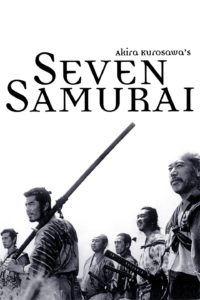 (1954)
(1954)
Director: Akira Kurosawa
Features: Keiko Tsushima, Takashi Shimura, Toshirô Mifune
Runtime: 113 mins.
Rating: Unrated
In ancient feudal Japan, a small, farming village faces constant attack from bandits and raiders, especially after harvest. Feeling they have nowhere else to turn, the farmers decide to hire samurai to protect their home using food as currency. Led by the wise but world-weary Kambei (Takashi Shimura), he enlists five other samurai… and one wild and angry man named Kikuchiyo (Toshiro Mifune), who may or may not be an actual samurai himself. Some are too young, some are too old, and Kikuchiyo is as unpredictable as he is useful. Knowing the odds are slim, Kambei also makes sure that the farmers themselves are trained and ready for battle. When the bandits do decide to attack the village, will these efforts be enough to save them or will this result in greater bloodshed?
Decades before The Avengers (2012) smashed box office records by showing a ragtag group of disparate and desperate warriors join together to save people and in turn become heroes, there was Seven Samurai. A true epic in every sense of the word, the film sits at almost four hours long, so Kanopy splits it up into Part 1 (everything before the intermission) and Part 2 (everything after) to digest a little easier. Like Ring and arguably City on Fire, Akira Kurosawa’s film was remade for Western audiences as well, as a western: The Magnificent Seven, itself remade several times. Even beyond its literal remake, the film basically created the genre recreated in The Avengers and many other films where a group of people who do not always get along or work well with others unite over a common, altruistic goal. Ranked number one on a BBC list of best foreign-language films of all time, polling critics from around the world, Seven Samurai remains as impactful and groundbreaking as when it was released in 1954.
—
More Kanopy Spotlights
- Kanopy Spotlight: Taika Waititi
- Kanopy Spotlight: Dario Argento
- Kanopy Spotlight: George A. Romero
- Kanopy Spotlight: A24
- Kanopy Spotlight: Black Cinema
- Kanopy Spotlight: Female Filmmakers

Eric J.
With 8 locations throughout Vanderburgh County, EVPL is ready to discover, explore, and connect WITH you! We encourage you to uncover new things, revisit old favorites, and to engage with us along the way.
200 SE Martin Luther King Jr. Blvd
Evansville, Indiana 47713
Administration: ceo@evpl.org
Card & Account: circulation@evpl.org
Feedback & Ideas: marketing@evpl.org


